David Cameron condemns public sector strike
- Published
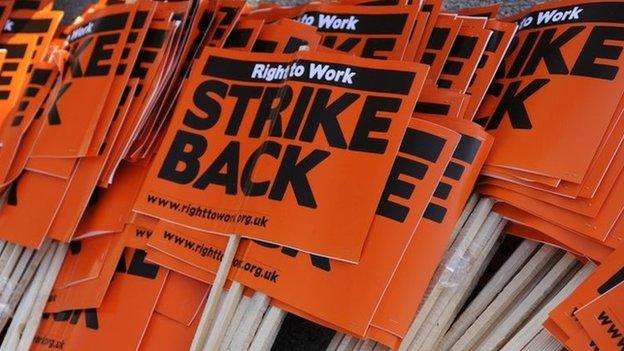
More than a million public sector workers are expected to join a strike on Thursday
People should go to work and not join Thursday's public sector strike, David Cameron has said, as he repeated a pledge to change strike laws.
The PM said the "time had come" to set thresholds on union ballots and pledged to include this in the Tory manifesto.
Umbrella union organisation the TUC said the UK already had some of the toughest strike laws in the world and called the changes "unnecessary".
Some unions have said they expect up to two million workers to walk out.
But ministers say they believe most people will go to work as usual.
Those set to strike include council staff, teachers, firefighters and civil servants who are protesting against a range of disputes, including pay, pensions, jobs and spending cuts.
Ministers froze public sector pay in 2010, and brought in a pay cap of 1% in 2012 which remains in place.
Those expected to take part in Thursday's action include:
Firefighters who are involved in a row over pensions and retirement age
The Public and Commercial Services Union - which represents civil servants, passport office workers and other public sector staff - in a dispute over pay, cuts to jobs, pensions and the privatisation of services
Unison which represents, among others, workers in local government, healthcare, colleges and schools and the GMB representing, among others, workers who serve school meals, clean streets, empty bins, carers and school support workers, in a row over this year's pay offer
Unite members - including local government staff, council workers and teaching staff - who also dismissed the "insulting" pay offer, external
The National Union of Teachers which says teachers are "under attack" from the government on pay, pensions, workload pressure and conditions
Members of the Northern Ireland Public Service Alliance, who work in a range of areas including housing, youth justice and libraries, will strike over pay, external
RMT members working for Transport for London will strike over pay and pensions, external
For Unite, Unison and the GMB the strike action covers workers in England, Wales and Northern Ireland but not Scotland, while the PCS covers all four nations. The FBU and NUT are England and Wales only.
Unions have claimed the strike will be the biggest since the pensions dispute, which led to a mass strike on 30 November 2011. The GMB said as many as two million workers could strike.
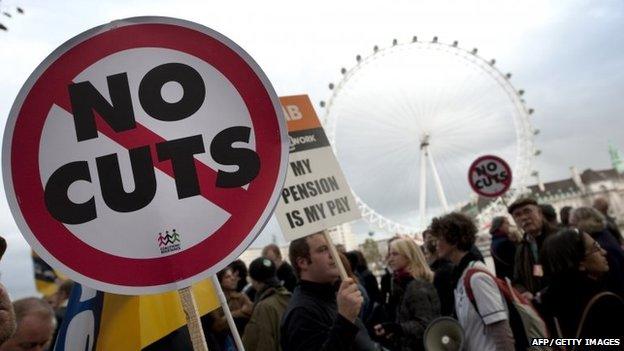
The UK saw mass action in November 2011 amid a dispute over changes to pensions
Under the current law, a strike can take place if it is backed by a majority of those balloted.
"I don't think these strikes are right... I think people should turn up for work," Mr Cameron told Prime Minister's Questions.
"I think the time has come for looking at setting thresholds in strike ballots... The [NUT] strike ballot took place in 2012, based on a 27% turnout.
"How can it possibly be right for our children's education to be disrupted by trade unions acting in that way? It is time to legislate and it will be in the Conservative manifesto."
But Mark Serwotka, PCS general secretary, accused Mr Cameron of "hypocrisy", saying unions were turned down when they offered to work with the prime minister to improve turnout.
TUC general secretary Frances O'Grady said: "The number of working days lost to industrial action is low.
"Instead of ill-thought out and unnecessary changes in the law, a better use of the prime minister's time might be to come up with ways to ensure that Britain's hard-pressed public sector workers begin to share in the economic recovery."
A Labour spokesman said the pledge was "just another example of Cameron making the situation worse by ramping up the rhetoric, rather than trying to solve the problem".
50% turnout?
Mr Cameron's remarks echo a pledge he made in May following a strike by Tube workers.
The prime minister's official spokesman said the Conservatives would look at a "a range of options" for changing strike rules.
He said a variety of proposals had been put forward, including on threshold levels, strike bans for essential services, and whether there should be a limit on how long a ballot is valid for.
He would not be drawn on whether the Conservatives were considering a turnout threshold of 50%.
He added there would be "no further movement" on strike rules during the coalition because of Liberal Democrat opposition.
- Published9 July 2014
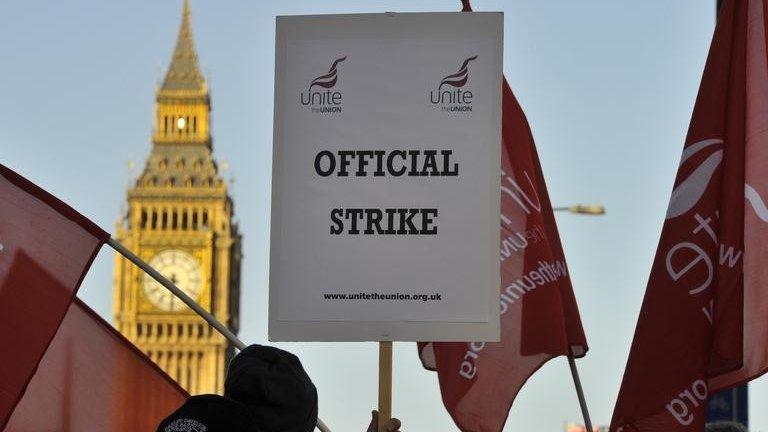
- Published9 May 2014
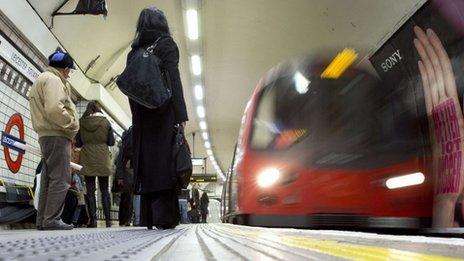
- Published6 July 2014
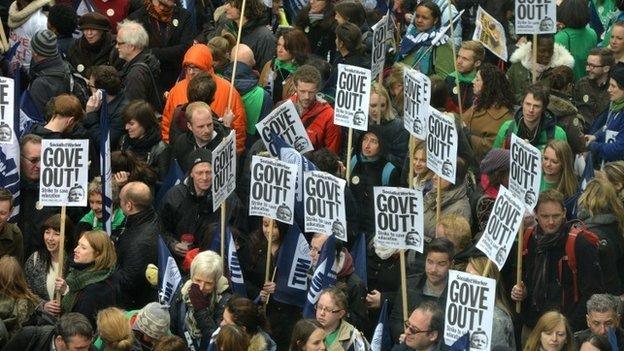
- Published30 April 2014

- Published26 February 2014

- Published5 February 2014
- Published4 October 2010